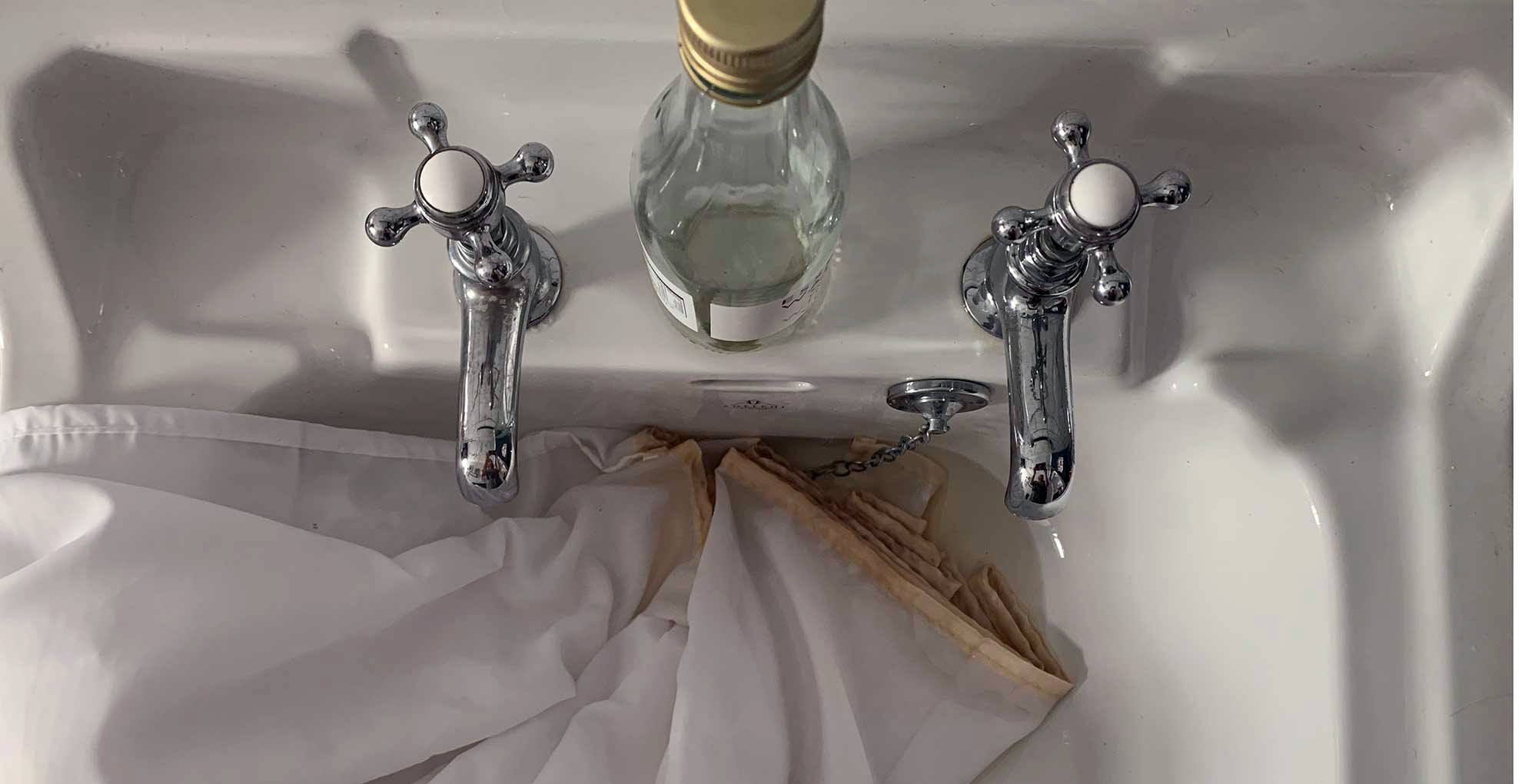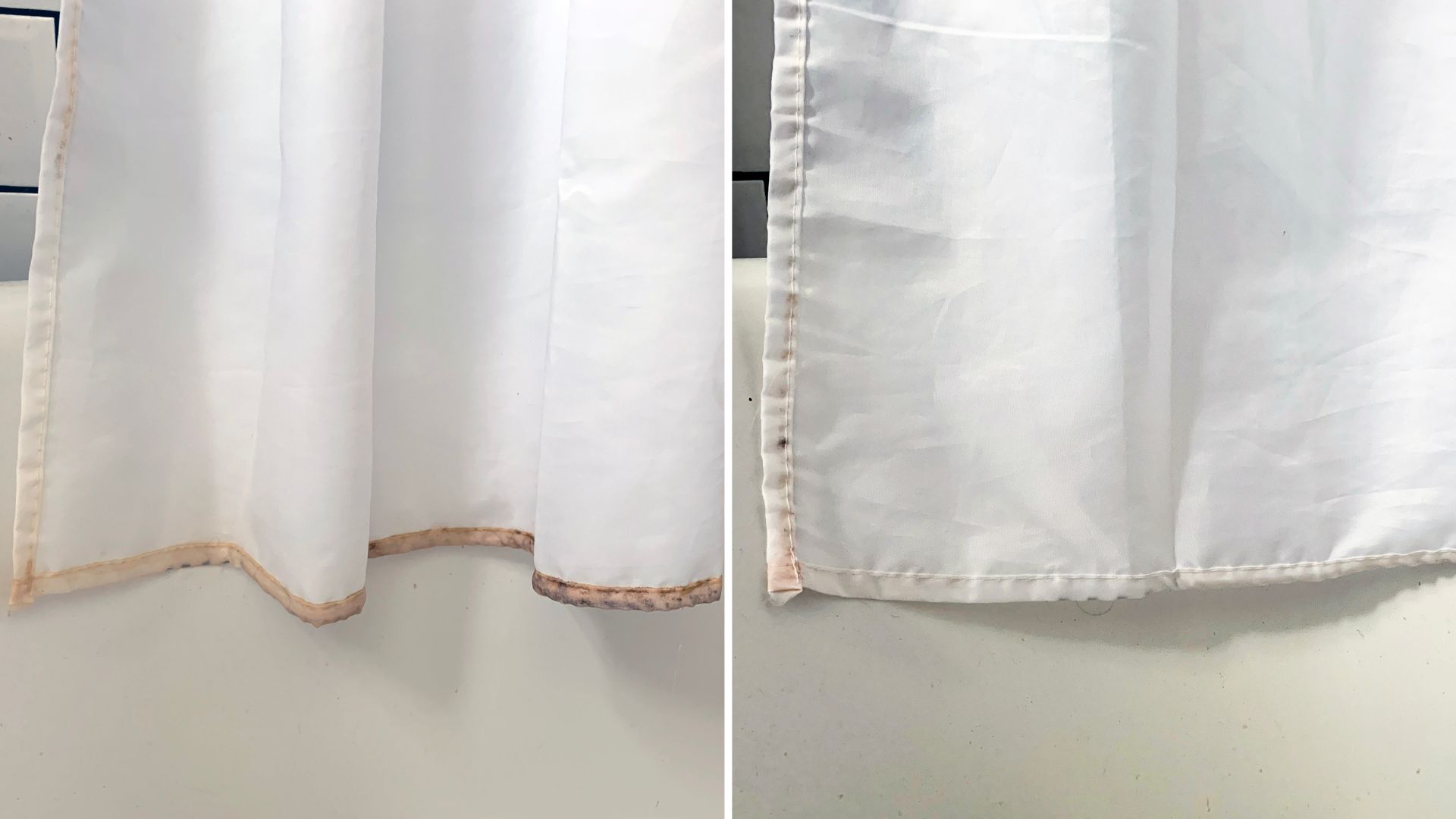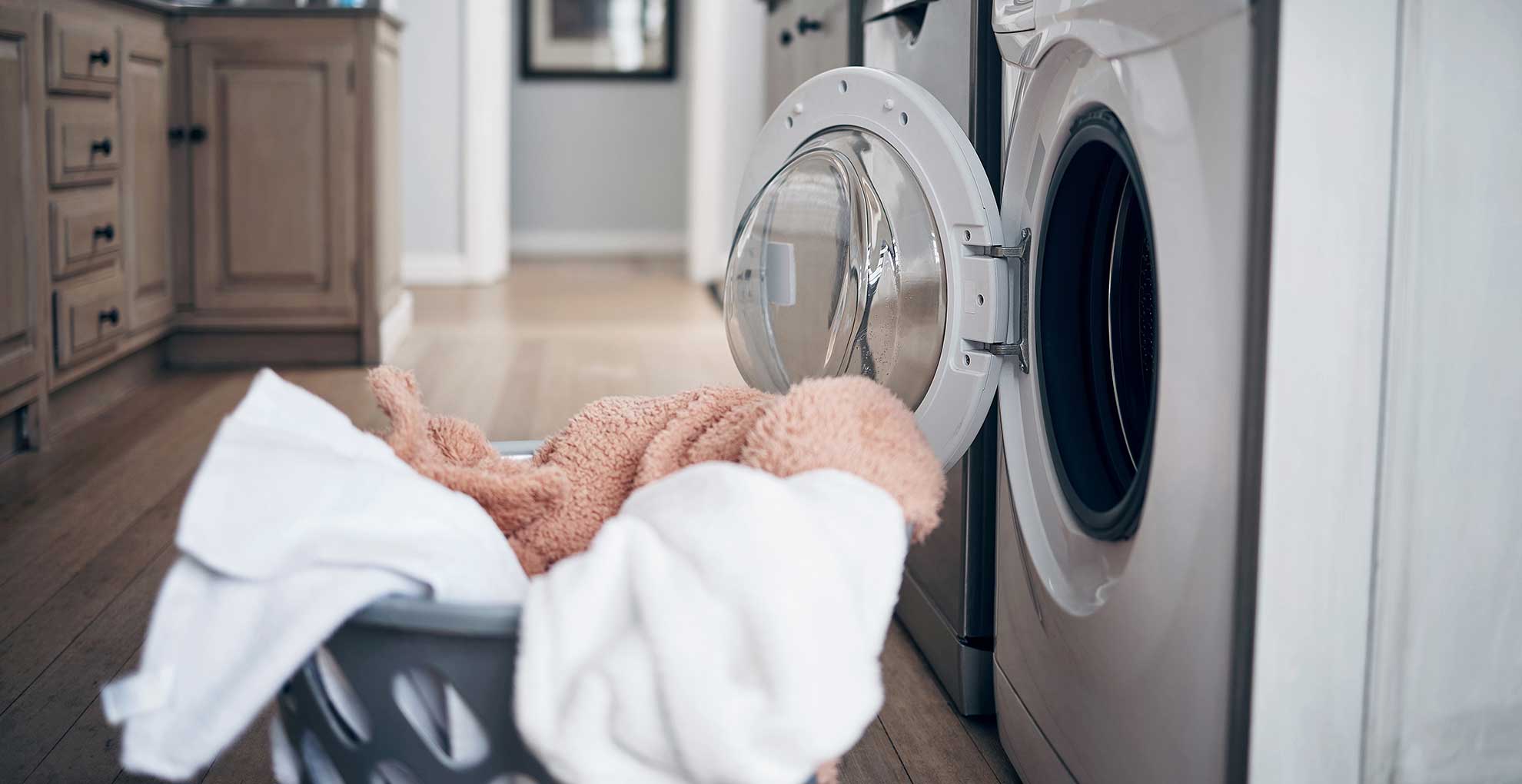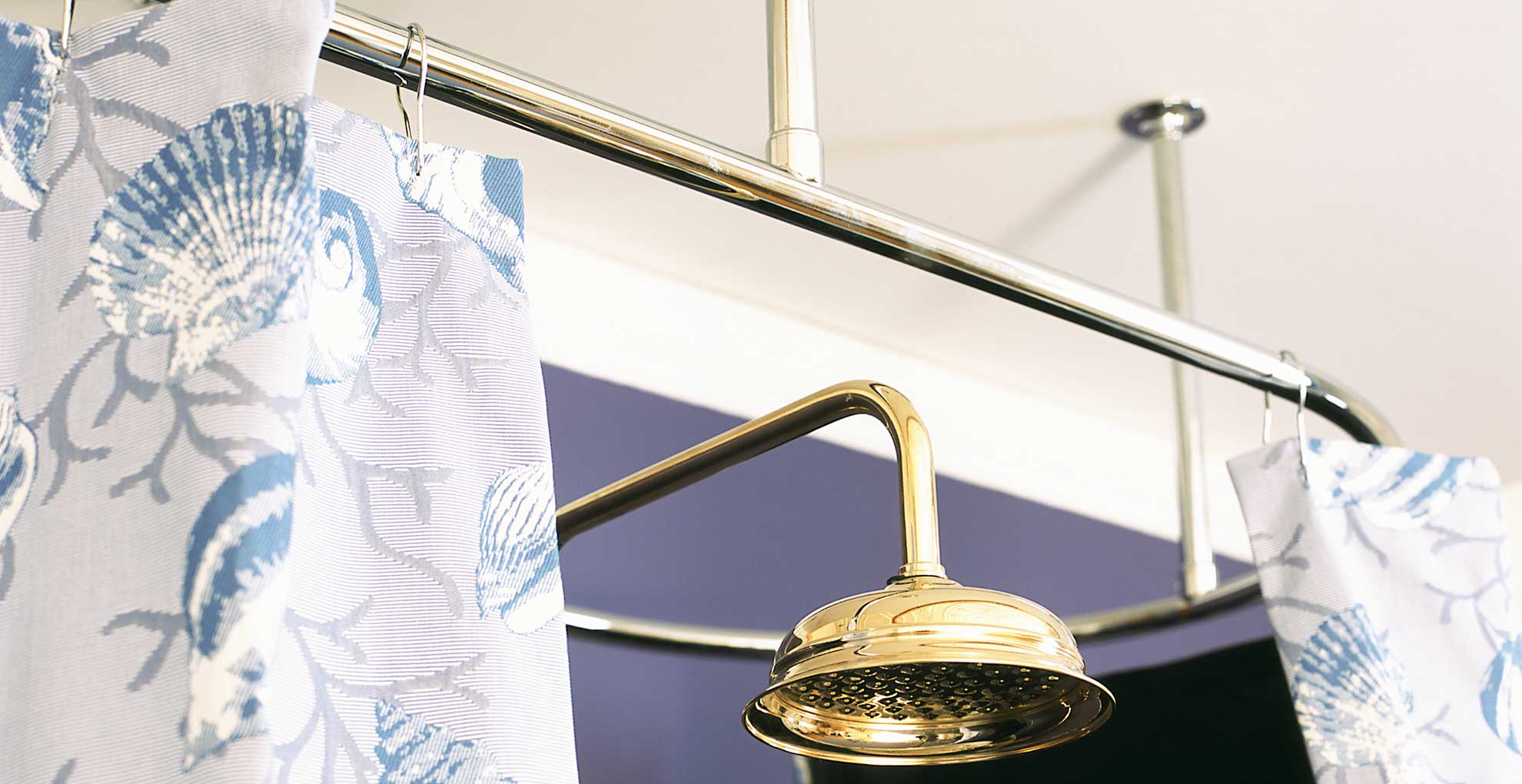
Few things are quite as satisfying as a pristinely clean shower, but it doesn't feel quite the same with a dirty shower curtain speckled with mould and mildew. Luckily, cleaning your shower curtain can be a simple task.
Your shower curtain goes through a lot during its daily shower duties, often splattered with wash products and the grime you're washing off of yourself. Frequent wetting and drying on your shower curtain can cultivate gross mould and mildew which is not only unsightly but unhealthy too.
Therefore, like cleaning a shower head your curtains should be a part of your regular bathroom cleaning chores.
Because no matter how unsightly, abandoning your shower curtain in its time of need is hasty and wasteful so we recommend trying a little TLC to restore its freshness. Below, we'll discuss two different methods of washing shower curtains clean, so they look as good as new.
How to clean a shower curtain
There are two methods you can use to easily clean your shower curtains to finesse your shower cleaning routine. Both of the easy-to-follow methods use all-natural cleaners that should be free of major allergens, with ingredients you probably already have around the house.
How to wash shower curtains by hand
For really filthy shower curtains, there's nothing like just hauling them outside to wash them by hand but if that's not possible you can use the bathtub or simply the floor of the shower cubicle. Wherever you wash your shower curtain try to minimise the mess you make.
What you will need:
- Hydrogen peroxide
- Baking Soda
- White vinegar
- Soft bristle scrubbing brush
1. Take the curtains down
Take your shower curtain off of the rings and the curtain rod. Fold the shower curtain so that any mould and mildew are tucked away while you handle the curtains.
"Lay the shower curtain flat in your bathtub or, if you don’t have one, a large washing basin to make the cleaning process more manageable," suggests Petya Holevich, a cleaning expert at Fantastic Services.
2. Soak in homemade cleaning solution

Soak the curtain in a cleaning solution to carry out general cleaning to remove as much surface dirt as possible. "Fill your clean bathtub or basin with warm water, and add 1 cup of baking soda and 1 cup of white vinegar," advises Petya. "This will help remove dirt, grime, and any unpleasant odours. Alternatively, you can also use a mixture of equal parts water and hydrogen peroxide."
Swish the shower curtain around in the cleaning solution, ensuring it’s fully submerged. "Let it soak for around 30 minutes to an hour. During this time, continue stirring it gently every now and then to help loosen any stubborn stains."
3. Scrub for targeted cleaning
Similar to when cleaning grout, your curtain might require a more targeted approach to cleaning mould. For spot cleaning try mixing a paste of equal parts baking soda and water. Use it to scrub especially mouldy or mildewy parts of the shower curtain. Flip over your shower curtain and repeat the process on the other side to ensure it is thoroughly clean.
"Once the soaking period is over, take a soft brush or cloth and scrub the entire surface of the curtain, paying extra attention to any remaining stains or areas with mould and mildew," says Petya. Afterwards, rinse it thoroughly with clean water to remove the baking soda solution.
4. Rinse to finish and air dry
Give the whole thing one last good rinse and hang it up, outside to dry in the sun if possible. Or you can simply hang the shower curtain back on the rod to let it air dry.
"Make sure it's fully unfolded to allow air to circulate and prevent any lingering moisture that might cause mould growth," says Petya.
The great thing about this method is that you can see the results as you're doing it. White vinegar, Hydrogen peroxide and baking soda are all much gentler than harsh chemical cleaners, so multiple applications of this cleaning technique when needed won't hurt your curtains.

How to clean shower curtains in a washing machine
If your curtains don't have a monumental level of buildup on them, then your washing machine probably has all the power it needs to take out that filth with some help from baking soda. This method doesn't allow you to see how effective cleaning is during the process, like the previous example, but is a lot less labour-intensive.
What you will need:
- Laundry detergent
- Baking soda
1. Carefully take the curtains down
Remove your shower curtain or curtains from the rod and fold inward to prevent any dirt from shedding throughout your house on the way to the washer. To remove the curtains you simply unhooked the curtain rings at the top one by one, taking care not to damage the material.
2. Select a gentle wash cycle

Put your shower curtain in the wash on the gentlest cycle available to ensure your curtain is not damaged by excessive heat or overzealous spinning.
A top tip is to add a few towels with your shower curtains to soften the impact and prevent them from being damaged by the agitator. Of course, only choose towels that are similar in colour to avoid any unintentional dyeing. It goes without saying that cleaning your washing machine is also a great way to ensure maximum results.
3. Add your washing powers
While you can use a washing detergent on its own, we recommend adding 1/2 cup of baking soda along with your regular laundry detergent to get the best results. Once the cleaning aids are in place it's simply a case of starting the cycle and waiting for the machine to do all the hard work for you.
4. Remove and hang to dry
Remove the shower curtains after the lowest spin cycle and allow them to drip dry out of the washer. When possible, sun-drying on a clothesline can help eliminate any lingering mould or mildew spores.
"After machine-washing, remove the curtain and hang it on the rod to dry, making sure it's fully unfolded," says Petya. "To prevent mould and mildew growth, ensure also proper ventilation in your bathroom and allow the shower curtain to dry completely between showers."
This method may not have the elbow grease of the first technique, but can easily be incorporated into your normal cleaning routine without the need to get wet and filthy every time you want to clean shower curtains. Between these two methods, no mould or mildew can stand up to your newly acquired shower curtain cleaning prowess.

What's the easiest way to clean a shower curtain?
The easiest way to clean a shower curtain is to pop it in the washing machine, but always check the care label first in case this isn't an option of your particular design – although most can be washed at 30 degrees. An expert cleaning hack to remove any mould around the bottom hem of your shower curtain is to soak the edges first before washing, to directly tackle the offending mould.
"If you noticed mould or mildew during the cleaning process, use a solution of 1 part water and 1 part white vinegar" suggests Petya. "Mix it in a spray bottle and spray or apply it to the affected areas. Let it sit for a few minutes before scrubbing and rinsing it or popping it in the washing machine (where possible).
Do you use vinegar or bleach on shower curtains?
Both vinegar and bleach can be used to clean shower curtains, but it's very important to understand the difference between the two ingredients and when to use each one.
Cleaning with vinegar is best for regular cleaning and maintenance of shower curtains. "White vinegar is a natural and non-toxic cleaning agent that’s effective against soap scum, mineral deposits, and some types of mould and mildew," explains Petya. "White vinegar, in particular, is commonly used for cleaning purposes because it doesn't leave any coloured residue."
To clean your shower curtain with vinegar, create a mixture of equal parts water and white vinegar. Pour it into a spray bottle and spray or directly apply it to the curtain, focusing on areas with soap scum or mineral buildup. Let it sit for a few minutes, and wipe or rinse it off. Vinegar can also be used in a soaking solution when cleaning the shower curtain without scrubbing. We filled a sink to submerge the end of the shower curtains where there were visible signs of mould.
"In contrast, bleach is a potent disinfectant and effective against tough mould and mildew stains. However, it should be used with caution," warns Petya. This is because it can damage certain materials and emit toxic fumes. "That’s why it's very important to follow safety precautions when using bleach."
"If your shower curtain is made of a bleach-safe material, for example, some plastics or vinyl, use a diluted bleach solution to tackle stubborn mould or mildew stains. Create a mixture of 1 part bleach to 10 parts water, and carefully apply it to the affected areas. Let it sit for a short time, and rinse it thoroughly with water. When using bleach, make sure to work in a well-ventilated area, wear gloves, and avoid mixing it with other cleaning products, because it can produce dangerous chemical reactions and toxic fumes.
Keep in mind that not all shower curtains are bleach-safe, especially fabric or coloured curtains and using it on an unsuitable material can lead to discolouration or damage. In general, for regular cleaning and maintenance, vinegar is the safer and recommended option. Reserve the use of bleach for specific cases where stubborn mould or mildew stains need to be addressed.

How do you clean plastic shower curtains?
Cleaning plastic shower curtains is a similar process to cleaning fabric ones, only there are some specific requirements for plastic materials. When cleaning plastic showers, the process consists of the same steps as fabric shower curtains but the cleaning solutions differ. "Prepare a cleaning solution by mixing warm water with a small amount of mild dishwashing detergent," advises Petya. "Avoid using harsh chemicals because they can damage the plastic material."
"Take a soft cloth or sponge and dip it into the cleaning solution. Wipe down the entire surface of the plastic curtain, paying special attention to any areas with soap scum, dirt, or stains," says Petya. "For tougher stains or stubborn soap scum, use a soft brush or non-abrasive scrubbing pad to gently scrub the affected areas. Even if they are hard to remove, avoid using abrasive materials that could scratch or damage the plastic."
Once you've cleaned the entire curtain, rinse it thoroughly with clean water to remove any soap or cleaning solution residue. Hang the curtain to air dry on the rod.
"Plastic shower curtains are susceptible to mould and mildew growth. To prevent this from happening, make sure to keep your bathroom well-ventilated by turning on the extractor fan or opening the window every time after showering. Also, try to keep the curtain as dry as possible between showers." These are also good measures to prevent condensation from building up in your bathroom.
How often should I clean my shower curtain?
How often you should clean your shower curtain, much like how often you should clean your bathroom generally may vary. How dirty a shower curtain gets will depend on a lot of factors, such as how often your shower gets used, and the hardness of your tap water. For most households, shower curtains should be fine with cleaning twice a month. However, other factors can encourage the growth of grime, mildew, and mould.
If the climate at your home tends to have more ambient humidity, you’ll likely have to wash the shower curtains more often. Humid conditions mean that moisture disperses from your shower more slowly. More people using your shower more often can also increase the risk of mould and mildew development.
Your tap water's hardness can also affect how quickly your shower curtain gets dirty. Hardness in water means that an excessive amount of trace minerals are contained within the water. While these are harmless to humans, they make it harder to wash off soap and detergents, which helps contribute to the soap scum. This soap scum is in itself pretty icky, and it can also contribute to mould and mildew growth as well, as it creates more places for the fungi to hide and flourish.
"When dealing with a shower curtain, prevention is key to keeping it cleaner for longer," says Petya. "After showering, leave it unfolded to dry fully, and regularly clean your bathroom to minimise soap scum and mould buildup."







